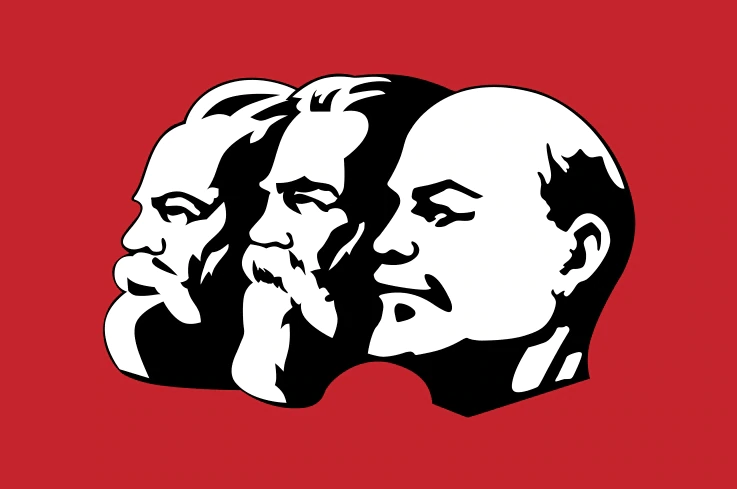More languages
More actions
TheSinnerOne (بحث | مشارکتها) (ترجمه ی کلی بخش نخست) |
TheSinnerOne (بحث | مشارکتها) بدون خلاصۀ ویرایش |
||
| خط ۱: | خط ۱: | ||
[[File:Marxism-leninism symbol.png|thumb|تصویر نشان دهنده ی [[کارل مارکس]]، فریدریک انگلز و [[ولادیمیر لنین]] به عنوان بنیان گذاران اصلی مارکسیسم-لنینیسم]] | [[File:Marxism-leninism symbol.png|thumb|تصویر نشان دهنده ی [[کارل مارکس]]، [[فریدریک انگلز]] و [[ولادیمیر لنین]] به عنوان بنیان گذاران اصلی مارکسیسم-لنینیسم]] | ||
<onlyinclude> | <onlyinclude> | ||
مارکسیسم-لنینیسم چهارچوبی ایدئولوژیک است که از استفاده ی تئوری های [[مارکس]] در رویه [[انقلابی]] توسط [[ولادیمیر لنین]] و [[حزب کمونیست اتحاد شوروی]] منشاء می گیرد. این مرام بنیان گذاری شده بر [[ماتریالیسم دیالکتیکی|ماده باوری دیالکتیکی]]، [[ماده باوری تاریخی]] و [[اقتصاد سیاسی مارکسیستی]] علاوه بر دیدگاه لنینیستی از [[استعمار]] و [[امپریالیسم]] است. | مارکسیسم-لنینیسم چهارچوبی ایدئولوژیک است که از استفاده ی تئوری های [[مارکس]] در رویه [[انقلابی]] توسط [[ولادیمیر لنین]] و [[حزب کمونیست اتحاد شوروی]] منشاء می گیرد. این مرام بنیان گذاری شده بر [[ماتریالیسم دیالکتیکی|ماده باوری دیالکتیکی]]، [[ماده باوری تاریخی]] و [[اقتصاد سیاسی مارکسیستی]] علاوه بر دیدگاه لنینیستی از [[استعمار]] و [[امپریالیسم]] است. | ||
نسخهٔ ۸ آوریل ۲۰۲۴، ساعت ۱۵:۴۶

مارکسیسم-لنینیسم چهارچوبی ایدئولوژیک است که از استفاده ی تئوری های مارکس در رویه انقلابی توسط ولادیمیر لنین و حزب کمونیست اتحاد شوروی منشاء می گیرد. این مرام بنیان گذاری شده بر ماده باوری دیالکتیکی، ماده باوری تاریخی و اقتصاد سیاسی مارکسیستی علاوه بر دیدگاه لنینیستی از استعمار و امپریالیسم است.
پس از موفقیت انقلاب 1917 روسیه و بنیان گذاری جماهیر شوروی در سال 1922، بسیاری از احزاب کمونیستی از اقصی نقاط دنیا مارکسیسم-لنینیسم را به عنوان ایدئولوژی سیاسی اصلی خود اتخاذ کردند. من جمله انقلاب هایی که با چهارچوب مارکسیست-لنینیستی به ثمر رسیده اند انقلاب های کره، ویتنام، کوبا، لائوس و چین و همینطور برخی دیگر از جنبش های انقلابی، استقلال طلب و ملی گرایانه در آفریقا و آسیا می باشند.
امروزه مارکسیسم-لنینیسم یکی از پایه های احزاب کمونیست در کشور های سوسیالیست فعلی از جمله چین، کوبا، کره، لائوس و ویتنام می باشند. این ایدئولوژی بسیاری از احزاب کمونیستی است که در حال مبارزه ی طبقاتی اند.
توسعه
خاستگاه عبارت
در دهه ی 1920 عبارت مارکسیسم-لنینیسم برای اولین بار توسط جوزف استالین بر اساس تلفیق تئوری مارکسیست و خط فکری لنینیستی تعریف شد.
لنین هیچگاه از عبات "لنینیسم" یا "مارکسیسم-لنینیسم" استفاده نکرد. لیکلن ایده های او که با توسعه دادن بر پایه های تئوری های کلاسیک مارکسیستی شکل گرفته بود، توسط بولشاویک ها و بسیاری کمونیست ها پس از ایشان به عنوان پیشرفتی چشمگیر تلقی شد.
متون اولیه
متون اصلی که مارکسیسم-لنینیسم را تأسیس میکنند نوشته های استالین در (1924) مبانی لنینیسم و Concerning Questions of Leninism (1926) هستند که مهمترین بخش های مجموعه ی مسائل لنینیسم را تشکیل می دهند. این مجموعه ی نوشته توسط استالین بطور تقریباً کامل مارکسیسم و لنینیسم را تلفیق میکند. همینطور تاریخ حزب کمونیست اتحاد شوروی بلشویکی که توسط کمیسیون کمیته ی مرکزی حزب کمونیست اتحاد شوروی در سال 1938 تنظیم شد.[۱]
خصوصیات
مادی گرایی تاریخی و دیالکتیکی
الگو:
بنگرید به مقاله اصلی: Dialectical materialism
By virtue of being a Marxist ideology, Marxism–Leninism concurs with the core Marxist tenets of dialectical materialism. Dialectical materialism serves as an essential form of analysis for any Marxist ideology and thus is a core component of Marxism–Leninism.
Critique of imperialism
بنگرید به مقاله اصلی: Imperialism
Imperialism as seen and described by Lenin is the highest stage of capitalism,[۲] involving the domination of the economy by monopolies and the export of capital as the principal form of exploitation and accumulation engaged in by the leading capitalist countries. Imperialism in the Leninist sense is essentially limited to the capitalist era.
Imperialism entails savage competition between the leading capitalist countries for colonies and spheres of influence, culminating in imperialist wars (such as the First World War, which Lenin witnessed).
Party organization principles
بنگرید به مقاله اصلی: Democratic centralism
Marxist–Leninist parties usually adhere to the principle of democratic centralism which involves free debate within the party and democratic development of party policies by the party members and their elected committees and leaders, but strict adherence by party members to those policies once the policies have been chosen.
Strategy and tactics of revolution
بنگرید به مقاله اصلی: Revolution
Marxist–Leninists hold that successful revolutions involve more than spontaneous, elemental action by the masses but require a vanguard party to provide them theoretical guidance and, in the revolutionary moment, tactical leadership. The vanguard (communist) party is based on full-time revolutionaries and is a repository of revolutionary experience.
Theory and practice of the dictatorship of the proletariat
بنگرید به مقاله اصلی: Dictatorship of the proletariat
Marxist–Leninists adhere to Marx's two-stages model of communism, involving an initial, "lower" stage, often termed "socialism", which is transitional between capitalism and "higher" stage communism in which the state, money, and other vestiges of capitalism and class society no longer exist. In the lower stage a state, controlled by the proletariat, remains necessary to defend against counter-revolution and to guide society away from capitalistic behaviors and toward cooperation and the "free association of the producers" which characterize true or higher-stage communism. The lower stage is also known as the dictatorship of the proletariat since it involves control of society by the proletariat.
Belief in the necessity of the dictatorship of the proletariat distinguishes Marxism–Leninism from more anarchistic tendencies within social liberation theory.
Classification
The term Marxism–Leninism generally includes parties which took the Russian Revolution of 1917 as foundational, while other socialist formations, usually those are opportunist and reject the Russian Revolution including but not limited to libertarian socialism, eurocommunism, Austro-Marxism, Bernsteinianism, syndicalism, Anarcho-communism, DeLeonism, and social democracy.
See also
References
- ↑ Ferenc Feher (1991), "Soviet Marxism", in Tom Bottomore, A Dictionary of Marxist Thought . (Anti-Soviet but informative).
- ↑ Imperialism, the highest stage of capitalism
